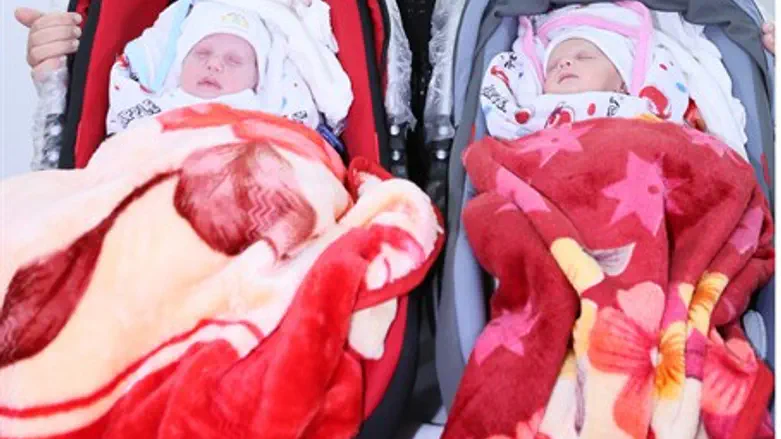
Israel accepts medical patients from Gaza for treatment on a regular basis, often as many as 70 patients per day.
But even the most seasoned Israeli doctors were surprised earlier this month when two separate, rare high-risk pregnancy cases were admitted to the same hospital, just days apart.
H., 35, was the first to arrive. The Gaza native was nine months pregnant and suffering from a rare blood clotting disorder which could endanger her life if she gave birth to her twins naturally. Within a short time of her admission to Rambam Medical Center in Haifa, a medical team managed to deliver her healthy son and daughter - weighing 2.3 kilograms (5 lbs) each - by caesarean section. H. remained in intensive care for six days, but her situation could have been fatal.
Within 48 hours of the surgery, H. regained consciousness and asked to see her infants. Because she was not able to walk yet, the staff photographed her children every day and brought the photos to her until she recovered.
"I still remember, when they took me from Gaza into Israel, the doctors said my condition was very severe," H. recalled. "For the first two days, before I woke up and made contact with my family, they thought I had never survived. They were sure I was dead."
"Until I saw my children with my own eyes, I did not understand myself what was happening," she reflected. "It was only when I saw both of them that I realized that I could relax - everything had turned out just fine."
While the transfer of pregnant mothers from Gaza into Israel is already rare, within a week Rambam saw yet another case: another Gaza native - A., 29 - was admitted just days after H., barely 8 months pregnant and with a rare medical condition: Rh disease.
Rh disease is a condition whereby the mother and her unborn child each have differing blood types, one negative and one positive. If the baby's blood comes into contact with the mother's during birth, antibodies will form - potentially attacking the infant's own immune system and leading to severe complications.
According to Dr. Ido Sholett, director of the High Risk Pregnancy Ward at Rambam, the condition could be treatable - but only with early detection and treatment.
"In a situation like this, where the problem remains undetected and is not treated in time, it can pose a dangerous threat to the infant's vital organs and even be fatal," Dr. Shollett explained. "But modern medicine usually can treat a high percentage of these cases in the early stages of pregnancy, using special medication and intrauterine blood transfusions."
A. gave birth to her infant son, premature at 33 weeks, only two days after arriving at Rambam. The infant suffers from a congenital heart problem and needed to be kept there for treatment. In the meantime, A. made the difficult decision to return to Gaza for ten days, so she could care for her other two young children. A. receives an update on her son by telephone daily.
"This is not a simple situation," said Yazid Falah, who is responsible for coordinating the medical treatment of Gaza residents at Rambam. "The most natural thing a mother is to be close to her newborn baby. We are doing everything possible to make the process go smoothly and make her feel as close to her child as possible, given the circumstances. “
H., meanwhile, is returning to Gaza - life and family intact. "My family waiting for us," H. stated, just before leaving the hospital. "Everyone says they already want to meet them [her twins] and hug them."
"This is the happiest day of my life. “